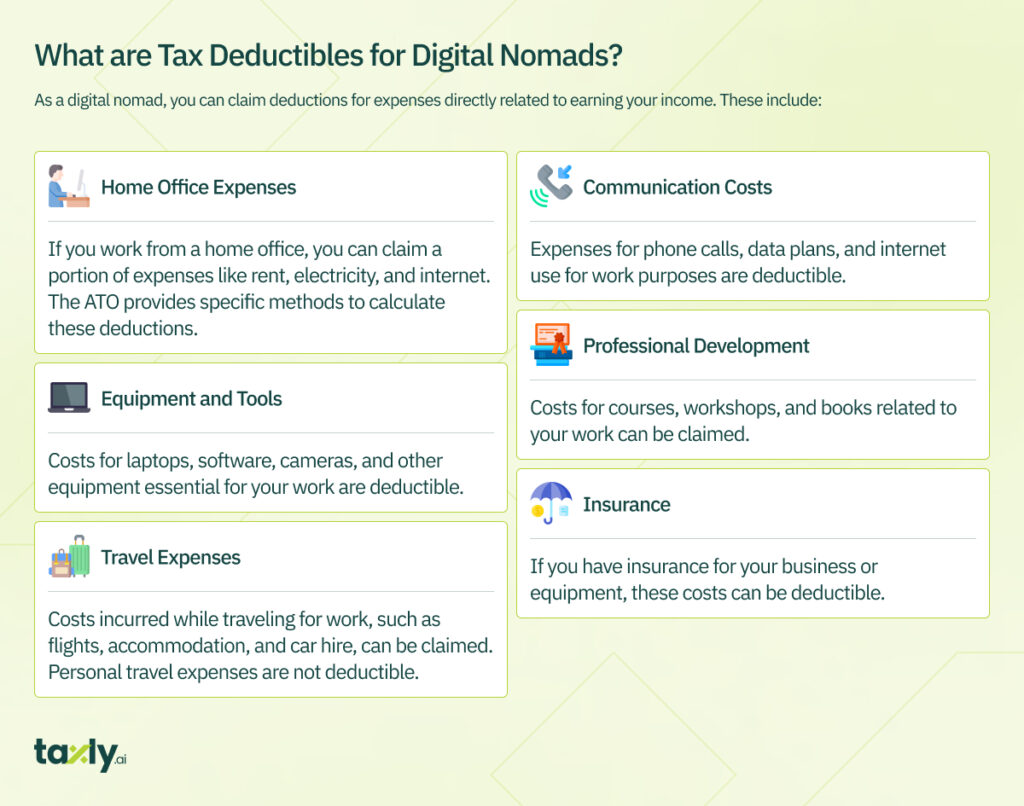Planning to escape the regular 9-to-5 grind? Move to Australia as a digital nomad and enjoy working remotely from your favorite international locations. Though these programs are attractive for international digital talent, these programs come with digital nomad tax obligations.
Who is a Digital Nomad?
Digital nomads are individuals working remotely from around the world. They travel to different locations and use digital tools to excel in different jobs like freelancer, web developer, programmer, digital marketer and more.
- The do not have a fixed physical presence
- Nomad income mostly comes from remote jobs
- They can open an international bank account
- They may pay tax in local country + host country
Most remote workers tend to lead a digital nomad lifestyle to improve their quality of life, manage cost of living, and explore different global opportunities.
Income Tax Obligations for Digital Nomads in Australia
Tax residents are taxed on their worldwide income, whereas non-residents are only taxed on Australian-sourced income. The Australian financial calendar year runs from July 1 to June 30. Tax returns are typically due by October 31. Digital nomads must report income from both Australian sources and international sources if they are considered residents for tax purposes. For non-residents, only income earned in Australia needs to be reported.
Verify Your Residency Status:
The most crucial aspect for a digital nomad in Australia is determining their tax residency status. Australia’s tax system considers you a resident for tax purposes if you reside in Australia or have been in the country for more than 183 days in a financial year – unless you can prove your usual residence is overseas.
Suggested Read: Non-Resident Tax Australia – All You Need to Know After Moving to Australia
Digital Nomad Tax Return Rates:
Income Tax Rates for Residents:
ATO uses progressive tax rates which increase as your income increases. The rates are as follows:
- 0 – $18,200: Nil
- $18,201 – $45,000: 19 cents for each $1 over $18,200
- $45,001 – $120,000: $5,092 plus 32.5 cents for each $1 over $45,000
- $120,001 – $180,000: $29,467 plus 37 cents for each $1 over $120,000
- Over $180,001: $51,667 plus 45 cents for each $1 over $180,000
Income Tax Rates for Non-Residents:
For non-residents, the tax rates are different and they do not have a tax-free threshold. Here’s a general guide to the rates:
- $0 – $120,000: 32.5 cents for each $1
- $120,001 – $180,000: 37 cents for each $1 over $120,000
- Over $180,001: 45 cents for each $1 over $180,000
Medicare Levy: Additionally, residents may be subject to the Medicare Levy, which is 2% of your taxable income, if your income is above a certain threshold.

Do Digital Nomads need to Register for GST?
If you’re running a business or freelancing and your turnover is $75,000 or more, you must register for GST. This involves charging GST on your services and can claim credits for the GST included in the price of goods and services you buy for your business.
Are you Supposed to Make Superannuation Contributions?
- If you are employed by an Australian company, superannuation contributions are likely to be mandatory.
- As a self-employed individual, you may choose to contribute to a superannuation fund.
Do Double Taxation Agreements Reduce Your Taxable Income?
Double Taxation Agreements (DTAs) do not directly reduce taxable income. Instead, they provide a framework to prevent the same income from being taxed by two different countries. This is achieved either by allowing one country to tax certain types of income and exempting it in the other or by providing tax credits in one country for the tax paid in the other. The primary goal of DTAs is to clarify tax obligations and avoid double taxation, not to reduce the amount of income that is subject to tax.
Australia has established Double Tax Agreements (DTAs) with over 40 countries to prevent double taxation and facilitate tax cooperation. Some of these countries include the United States, the United Kingdom, China, Japan, Germany, India, and Canada. Each DTA may have different provisions and implications, especially for digital nomads who might be taxed in multiple jurisdictions. These agreements usually determine which country has the right to tax certain types of income and provide mechanisms for relief from double taxation.
Final Thoughts
Digital nomads and taxes go hand in hand. As a digital nomad, you are essentially supporting multiple economies so it’s important to beware of the local tax laws. Digital nomads in Australia enjoy various perks and deductions along with DTA benefits.


Comments are closed